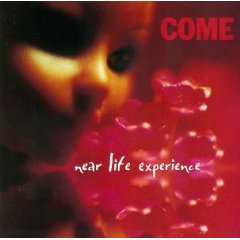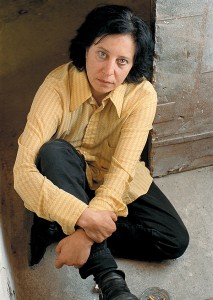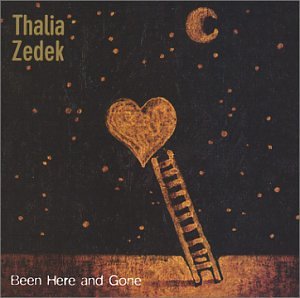FOREWORD: Though I’d spoken to Come boss, Thalia Zadek, and right-hand axe man, Chris Brokaw, several times before (at the Mercury Lounge and other venues), this 1997 interview at a Chelsea café in Manhattan was our first ‘sitdown.’ Zedek had worked her way up the alt-rock no wave ladder through formative bands such as Dangerous Birds, Uzi, and Live Skull, releasing a few solo albums after Come disbanded in ’99. Chris Brokaw, former Codeine drummer, made over a half-dozen hard-to-find but easy-to-love and anything-but-compromising solo albums, including ‘05s truly superb Incredible Love. His live show at Maxwells in Hoboken during ’08 was one of my favorite events of the year. This article originally appeared in HITS magazine.
Baseball legend Babe Ruth grew up in Baltimore and reached Hall of Fame status playing for the Boston Red Sox and New York Yankees. Similarly, venerable tortured artist, Thalia Zadek, was raised in Baltimore, then settled in Boston after gaining initial credibility playing New York’s Lower East Side. She lent her formidable talents to cult faves Uzi and Dangerous Birds during the ‘80s. Along with Scarsdale, New York native and co-guitarist Chris Brokaw, they formed the critically acclaimed band, Come, recording audacious debut, 11:11 in ’92, and its respectable follow-up, “Don’t Ask Don’t Tell” two years later. With bassist Sean O’Brien and drummer Arthur Johnson in tow, they also backed former Dream Syndicate leader Steve Wynn on ‘96s Melting In The Dark.
 For Come’s current project, Near Life Experience,” Zedek and Brokaw recorded and then toured with Tara Jane O’Neil and Kevin Coultas, both of whom are on loan from ethereal mood purveyors, Sonora Pine. Near Life Experience damn well could be Come’s most accessible and adroit full length disc. It prominently features the cellophane-wrapped miasmic opener, “Hurricane,” the twisted mantra, “Weak As A Moon,” the tension-packed, electrocution “Bitten,” and the balmy reflection, “Sloe-Eyed.”
For Come’s current project, Near Life Experience,” Zedek and Brokaw recorded and then toured with Tara Jane O’Neil and Kevin Coultas, both of whom are on loan from ethereal mood purveyors, Sonora Pine. Near Life Experience damn well could be Come’s most accessible and adroit full length disc. It prominently features the cellophane-wrapped miasmic opener, “Hurricane,” the twisted mantra, “Weak As A Moon,” the tension-packed, electrocution “Bitten,” and the balmy reflection, “Sloe-Eyed.”
I spoke to Zedek and Brokaw at a Chelsea diner. Legend has it they picked up the check.
How did you come up with Near Life Experience’s twisted title?
THALIA: The title refers to a slip of the tongue. I was telling someone I had a ‘near life experience,’ but meant to say near death experience.. Chris was cracking up at the imagery of that.
How has your music developed over the years?
THALIA: The Dangerous Birds were very poppy. We had a lot of different ideas. But I got into straight punk afterwards. I began to like the unstructured music of the Birthday Party, which was similar to punk if you tore it apart.
How can artists maintain critical acclaim when impending popularity offers the chance to sell out?
THALIA: I think music that is really original will get popular. Musicians aren’t doing themselves a favor by jumping on a trend because trends change. If you make stuff that’s interesting and original while trying to express yourself rather than copy someone else, it’ll be appreciated. You may not be a superstar, but you’ll get an audience. It doesn’t make sense to me how people pander and sell out because if you lose credibility and integrity, there really isn’t much else. I like different types of music. But I’m always baffled by what gets popular.
What current band annoys you?
THALIA: Everclear strikes me as writing incredibly stupid songs. They get on my nerves and make me want to cringe. I like catchy songs with good melodies, like Oasis, but I don’t get into their silly lyrics.
What’s the first record you ever owned?
THALIA: Either “Kung Fu Fighting” or the Carpenters “Top Of The World.” I actually didn’t buy much music later on. The first musician I was really into was Bob Dylan. I remember Leonard Cohen. I love his song, “Suzanne.” I discovered more of his music later on.
The gloomy despair of your first two albums seems not as prominently displayed on Near Life Experience. Do you have a happier outlook?
THALIA: I don’t have a more satisfied outlook. But my outlook has changed. I can’t pinpoint what happened, but after 11:11 and Don’t Ask Don’t Tell, we tried to show some variety by not having just a single mood. Instead, we’d write five slow songs and then there would be one fast one thrown in.
The cover art for Near Life Experience seems to imply a reawakened innocence.
THALIA: What it implies is something not quite real. This German lady, Imche Wagner, took those pictures. I loved the colors and the doll sniffing flowers seemed fitting in its artificial nature. But there’s nothing artificial about the music. (laughter)
What made you want to pursue music, Chris?
CHRIS: My dad used to play drums. He once sat in for Jerry Lee Lewis. It was a fluke. He went to see him play at a roadhouse in Indiana and his drummer never showed up. He got paid and did a few sets.
Do you feel restrained being in a backup role to Thalia?
CHRIS: The main reason I play with Thalia is she’s a really good guitarist. Our friends introduced us and we played for hours. It was a great situation because we had a good musical dialogue. And she’s a great lyricist and singer. I’ve always trusted her judgement, even when she puts my music into words. The attention may be on her, but so is the pressure. Our stuff isn’t exuberantly happy so the press picks on Thalia, which is a relief.
What’s the difference between touring Europe and touring the States?
CHRIS: In Europe, they want you to play for a long time. It’s something they speak very highly of. My friends saw Guided By Voices in Berlin and they did five encores. In the States, they’d say that’s enough. But Europeans seem to have a longer attention span.
Who are some of your musical influences?
CHRIS: I was reading Please Kill Me by Legs McNeil. It had quotes from several late ‘70s punk bands which I realize influenced me. New York Dolls. Richard Hell. Iggy Pop, the Contortions, Public Image Ltd. And Bush Tetras. But lately, I’ve been listening to Charles Mingus and other Jazz artists.
What are the first records you owned?
CHRIS: Jeff Beck’s Beck-ola, the New York Dolls’ Too Much Too Soon, and Kiss Alive. One of the reasons I learned to play guitar was because of Kiss. Before that, I bought the singles ‘Bad Bad Leroy Brown” and “Monster Mash.”

